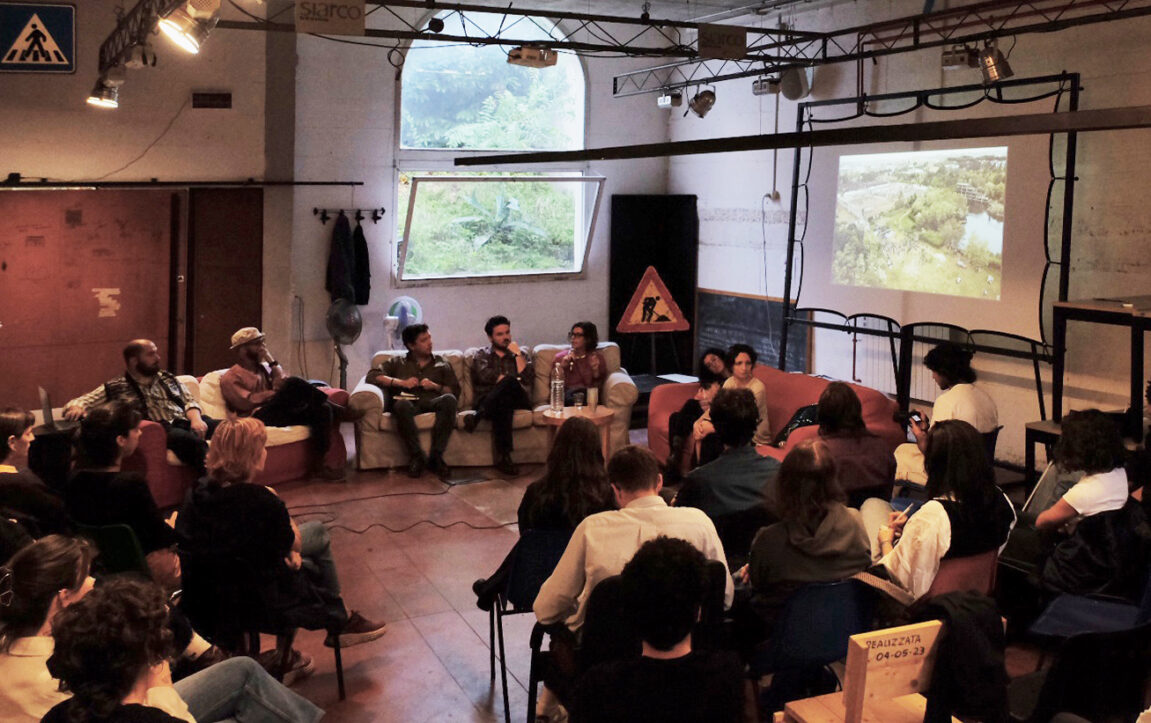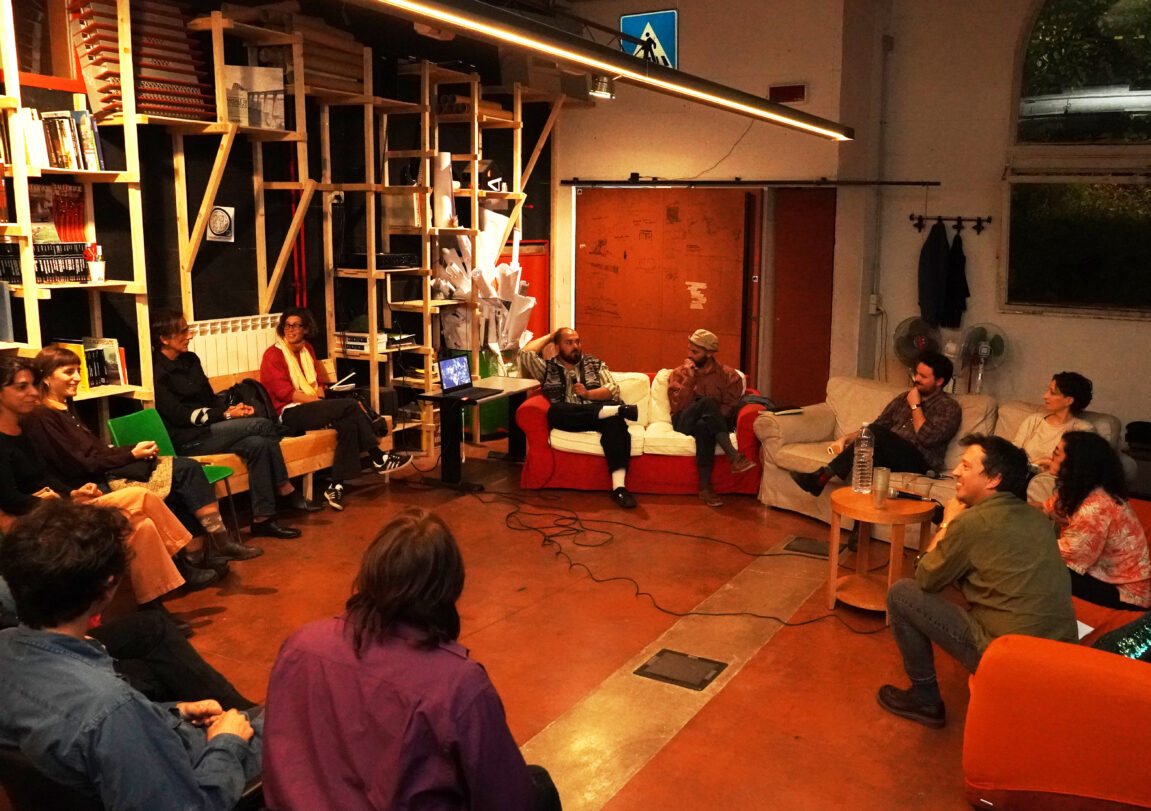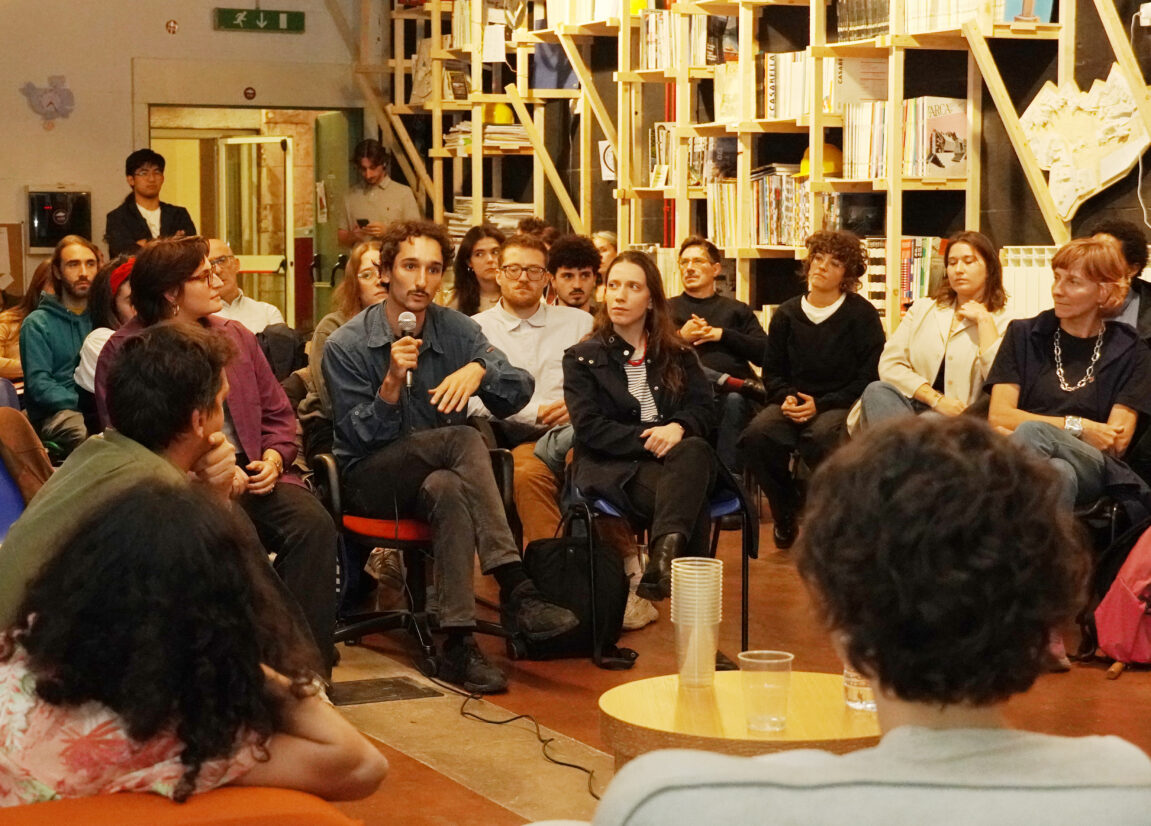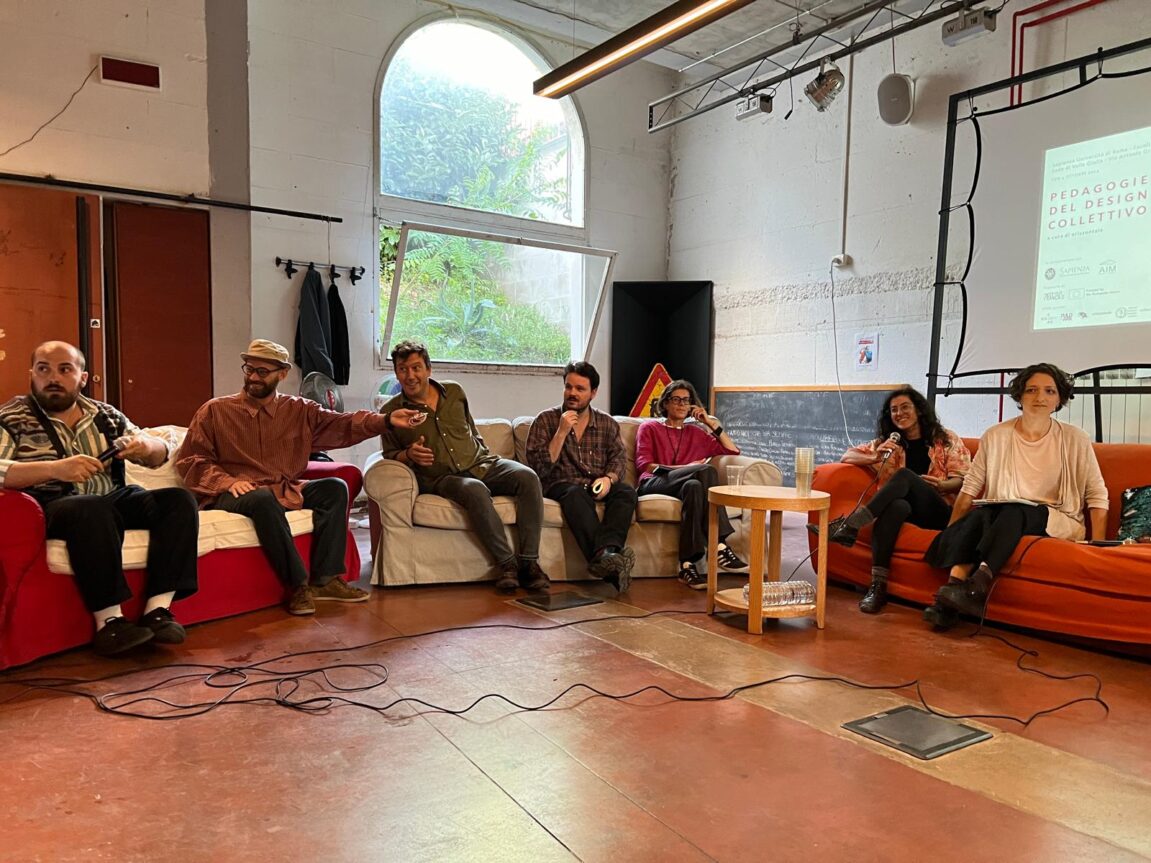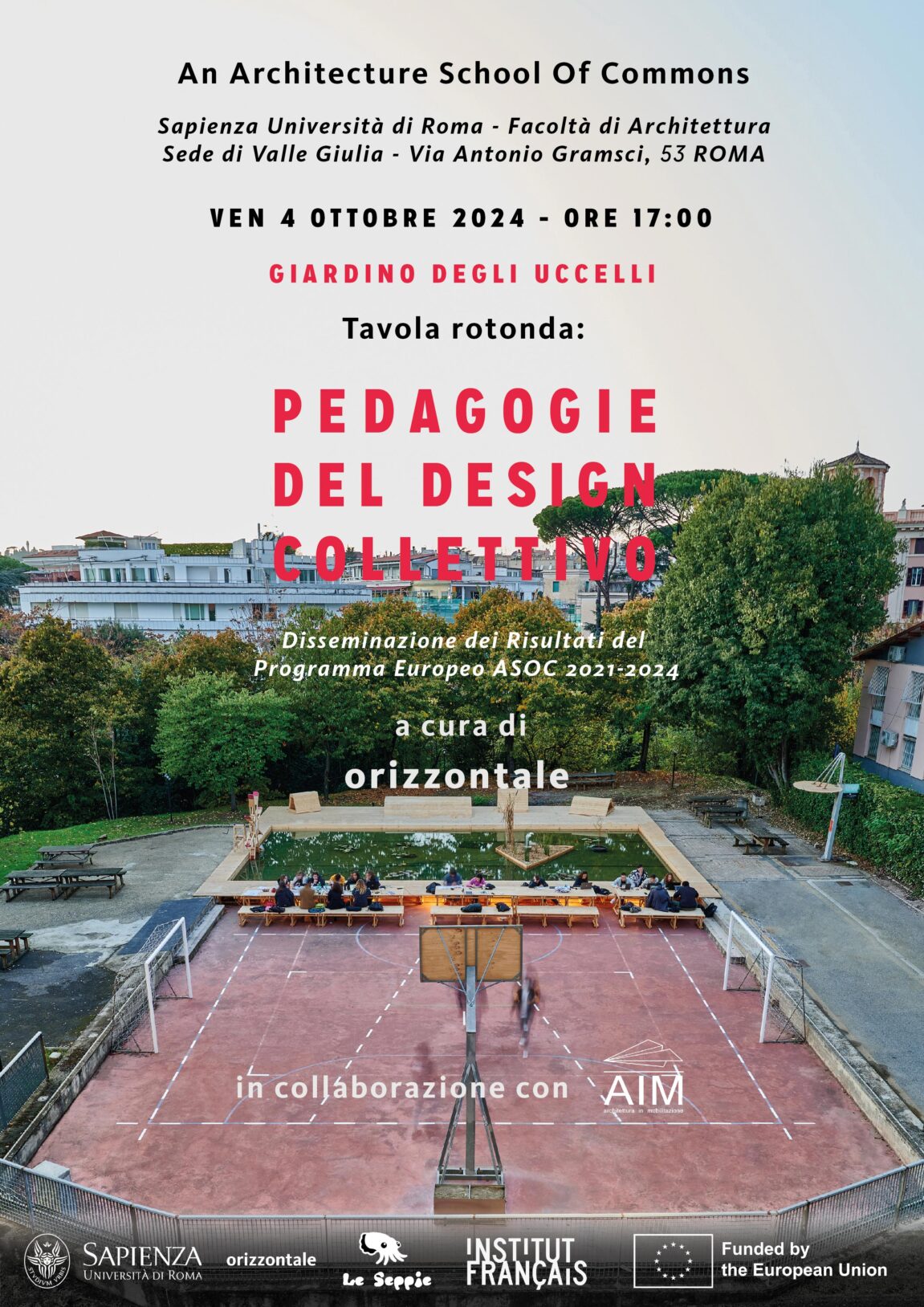
The event “COLLECTIVE DESIGN PEDAGOGIES | PEDAGOGIE DEL DESIGN COLLETTIVO” was organized and moderated by orizzontale in partnership with the Faculty of Architecture Sapienza University of Rome and organised in collaboration with the collective AIM – Architecture in Mobilisation, in Roma the 4 of October 2024.
Due to uncertain weather, the event, scheduled to take place at the lake in the “Giardino degli Uccelli” (Birds’ Garden), was then held in the “Petruccioli” lecture hall. This self-managed space was opened by the collective AIM, inside the historical venue of the Faculty of Architecture of La Sapienza, Valle Giulia as a multifunctional shared space for study, critics, events and leisure.
With:
Federica Fava – Roma Tre, Giulia Fiocca – Stalker, Collective AIM – students faculty of Architecture of Rome Sapienza
Unfortunately, among the guests, artist Marinella Senatore and the Head of the Faculty of Architecture at Sapienza University, Orazio Carpenzano, were unable to attend the event due to health problems.
Brief EN:
The contemporary crises have posed us the challenge to reflect and rethink forms of living together and consequently, to generate transformation processes that are sensitive to the environment and the context in which they take place.
These processes have the commons as their central theme and rediscover a connection with the local dimension, in dialogue with communities. They question the use of resources, explore new or forgotten knowledge, customs and habits and promote minimal, flexible and reactive interventions to unforeseen events or needs.
In this panorama, areas of experimentation and ways of learning and transmitting knowledge are multiplying; from lively urban transformation laboratories to research programmes within or outside cultural and educational institutions, and even the creation of new Schools/Academies, thanks to the energy and active collaboration of directors, teachers, professionals and students.
We invite you to take part in the discussion and the topics that will be brought to the table, sharing radical visions and experiences, past or new.
Examples that feature the rethinking of organizational systems, the opening up of transformation processes, the creation of new spaces for exchange and sharing.
Spaces where empathic, horizontal, interdisciplinary collaborative and pedagogical forms can be promoted, each with its own methodology and organizational structure. All with the common objective of caring for the places in which they grow.
Full Presentation:
Through the presentation of the ASOC website, orizzontale has showcased some of the sensitive and narrative content related to the theme of new forms of pedagogy to be experimented in partnership with architecture schools. Focusing on the three years experience it was underlined how the pedagogical methodology adapted to the different locations, so that it could respond to the specific conditions of the places.
Which innovative research experiences are fuelling new forms of transformation and collaboration in schools of architecture?
With this open question we introduced the guest speakers.
Giulia Fiocca architect, independent researcher, activist, deals with urban and social transformations, marginal communities, abandoned spaces, social and cultural self-organization practices, since 2006 with Stalker in Rome. She presented the bottom-up approach of Stalker and its SUN – School of Nomadic Urbanism. Outdoor itinerant and playful, open to all* with or without a degree or residence permit. SUN is a reciprocal, explorative and experimental learning path to train in social creativity and collective action. Participants are invited to be present, to respect others, to listen to places and their inhabitants, to conviviality and to creative interaction with the unexpected and the stranger. The school is the tool for the shared construction of artistic and citizenship paths, each time different, proposed by Stalker.
Were presented as case studies:
- Spontaneamente, Exploratory walks through Rome, in which certain places in the city are used as amplifiers of political demands or as outdoor classrooms.
- Asylum, the reuse of a Pavilion built and conceived for Villa Medici Festival of the Cabanes, repurposed for the self-managed space of Ex-SNIA.
- La Zattera, magazine of the history of Borghetto Prenestino through the words of the neighbors
- Mad’o Museum of the Act of Hospitality, foundation of a museum in the self-managed space Spin-time
Federica Fava: Post-doctoral researcher Roma Tre in the field of reuse and regeneration of urban (cultural) heritage through participatory practices that prove innovative in the material and immaterial contexts of the city. Introducing the topic of TRANSIENTS. Living spaces and processes, she presented the research on disquiet bodies under the point of view of the relationship between body, mind, architecture and spaces. Transient objects are able to change the interaction rules between disquiet architecture and inhabitants or visitors to form a new balance. She showed the project of We-z, reconnecting communities and places through imperfect health, a top-down initiative prompted by Roma Tre and other institutional partners and co-financed by the European Commision. We-z park encompasses the Vigne Nuove complex, the installation of new green infrastructure, public spaces and welfare, reconnecting territorial and neighborhood areas.
Collettivo AIM: AIM – Architettura In Mobilitazione is the collective of the students of the Faculty of Architecture at La Sapienza in Rome. Starting from the connection of the birth of Mobilising Architecture, approach and the relationship with the Valle Giulia Faculty of Architecture. The birth of the Collettivo architettura in Mobilitazione (Architecture Collective in Mobilisation), when the faculty of architecture was occupied to protest against Gelmini’s shameful education reform, is also linked to the opening of the Petruccioli lecture hall. Its characteristics and approach according to these issues are presented:
- The continuous transformation of the collective, which changes as the students leave the school.
- The description of the space of the Petruccioli hall and its metamorphosis over the years changing with the collective
- The relationship with the students’ rights in communication with the network of other mobilizing collectives at Sapienza
- The actions on the spaces in the Faculty of Architecture building and the interventions designed by orizzontale and carried out in self-construction for the new Laghetto/Ninfeo in the Giardino degli Uccelli (Bird Garden) and in the historical courtyard of the faculty.
The Q&A session mainly focused on the following topics:
- The action carried out at specific times on the three ASOC sites showed different scenarios of the transformation process, offering data on how and why specific outcomes occurred and giving the possibility to adapt and adjust the process.
- Space of improvisation in Schools of Architecture as a soft and plastic system to learn, being flexible, open and temporary. La Place Tropicale and Fresh playground developed by orizzontale within ASOC, were used as concrete examples.
- The relationship between bottom-up and top-down initiatives, presented within the roundtable was an example of the importance of an alliance between self-managed and informal spaces and more structured institutions and the attitude of being open to collective questioning.
The participants moved outside to visit the places in the Faculty of architecture that were shown during the presentation. The event finished at the Lake with the aperitivo and small party organized by orizzontale in collaboration with Collettivo AIM.
About the other GUESTS that couldn’t attend:
Orazio Carpenzano: Architect and Professor of Design in the Faculty of Architecture at Sapienza University of Rome. Dean of the Faculty of Architecture since 2020, former Director of the Department of Architecture and Design (2016-2020). Director of the Doctorate School in Architectural Sciences – Sapienza University of Rome; coordinator of the PhD in Architecture Theories and Design – Sapienza University of Rome
Marinella Senatore: Marinella Senatore is a multidisciplinary artist whose practice is characterized by a strong collective and participatory dimension both in terms of methodology and content; her work combines aesthetic research with the transformative power of social commitment.
